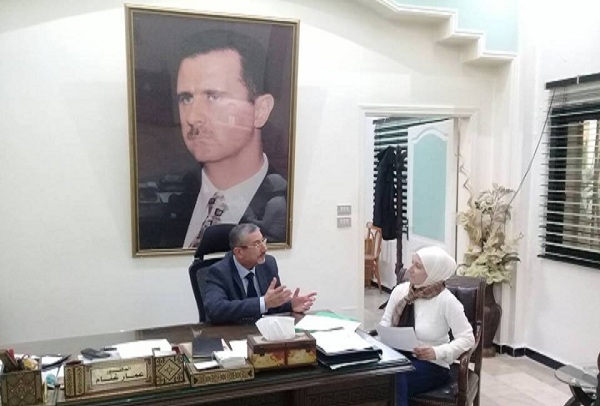Health Sector Spares No Effort to Provide Essential Medical Services to Citizens Despite Terrorist War, Sanctions
Despite the seven-year unjust war, the coercive sanctions imposed on Syria and the systematic terrorist attacks against medical establishments, the health sector in the country is still providing essential medical services to citizens mainly those who are affected by the war.
Shedding light on the health situation in Lattakia province, Syriatimes e-newspaper interviewed Dr. Ammar Ghannam, Director of Health there.
Dr. Ghannam said the war on Syria is undoubtedly the worst humanitarian crisis in the world as it produced big challenges and difficulties” stressing that the health sector was targeted cruelly and savagely.
He made it clear that the health sector, as other vital sectors in Syria, has faced major difficulties mainly the shortage of medical equipment and medicines in the light of the unilateral economic sanctions imposed on Syria. He pointed out that these sanctions have hindered the procurement of spare parts for medical equipment in hospitals that provide health services to all citizens particularly those who are affected by the ongoing war on Syria.
Dr. Ghannam clarified that many hospitals and health establishments were damaged, burnt or exploded due to the barbaric acts of the terrorist groups in all Syrian provinces, including in Lattakia’s countryside.
Supporting the health sector a Priority
He highlighted the fact that supporting and enhancing the Syrian health sector is one of the priorities of the Syrian government’s work.
 Dr. Ghannam pointed out that Syria has proved its technical efficiency in meeting the health demands of all citizens basically medicines, in carrying out medical operations, in launching vaccination campaigns and treating serious diseases in a way that reflects the keenness of Syria’s government on guaranteeing good health situation in the country.
Dr. Ghannam pointed out that Syria has proved its technical efficiency in meeting the health demands of all citizens basically medicines, in carrying out medical operations, in launching vaccination campaigns and treating serious diseases in a way that reflects the keenness of Syria’s government on guaranteeing good health situation in the country.
He went on to say that the ministry of health in cooperation with the Syrian government adopted an urgent policy and procedures aiming at rehabilitating hospitals and health establishments, providing citizens with preventive, curative and emergency health services at high level and without discrimination, particularly for health conditions related to immunity, hereditary and tumors, along with other types of medicines not produced locally in addition to medical equipment.
He made it clear that the health ministry exerted big efforts in cooperation with the national drugs factories to ensure more than 92% of drugs to be offered to markets and hospitals.
Medical Cooperation with Iran, Russia
Dr. Ghannam hailed joint cooperation with Iran and Russia in supplying Syria with all kinds of medical assistance mainly medicines and spare parts, stressing that this cooperation with the friendly countries have reflected positively on the services of the health sector and aimed to minimize the negative impacts of the crisis on health situation as much as possible.
When asked about cooperation with international organizations, Dr. Ghannam said” Syria is committed to working with some organizations such as the World Health Organization( WHO), UNICEF, Red Cross and Red Crescent as they are vital partners in providing medical supplies of primary health care, particularly in terms of importing medicines, medical equipment, and vaccines, as well as taking part in overcoming the unilateral economic measures imposed on Syria”.
He highlighted the fact that due to efforts by the WHO, the UNICEF and the Syrian Arab army, the health ministry managed to deliver essential emergency supplies and services for Syrian families in the hardest-to-reach and besieged areas of Syria.
“Within this framework, vaccination campaigns covered 98% of the country,” Dr. Ghannam added.
 He affirmed that the vaccines are safe, active and imported from the best world countries and under the supervision of international organizations, asserting that the vaccination campaigns are important not only for defending the rights of children but also for safeguarding their future.
He affirmed that the vaccines are safe, active and imported from the best world countries and under the supervision of international organizations, asserting that the vaccination campaigns are important not only for defending the rights of children but also for safeguarding their future.
Dr. Ghannam referred to the constructive role played by the Administrative Development Department at the health directorate in holding training courses for the personnel, launching constantly pesticide spraying campaigns to help prevent the spread of serious diseases as leishmaniasis.
He praised fruitful cooperation with the unions of physicians, pharmacists and dentists, noting that 14 medical conferences were held in 2017.
When asked about the ambulance service system, Dr, Ghannam said” it has always aspired to provide the highest quality emergency care during the crisis, stressing the ambulance system was actively and successfully able to withstand all the difficulties and obstacles.”
He pointed out that the ambulance system participated in transferring all the persons wounded in aggressive and criminal attacks inside Lattakia or outside it, indicating that it was able to carry out 18000 medical tasks in 2015 and 14000 tasks in 2017 since the security general situation has got better.
War Wounded Program
Concerning the “War Wounded Program”, Dr. Ghannam clarified that supervisors of the program follow-up the conditions of the wounded personnel to distribute medicines and provide physical treatment to them in health centers. They also visit the wounded in their houses to support them psychologically.
He noted coordination between the “War Wounded Program” and the Administration of Military Medical Services to provide necessary services to all the war wounded across the country.
Interviewed by Rawaa Ghanam

